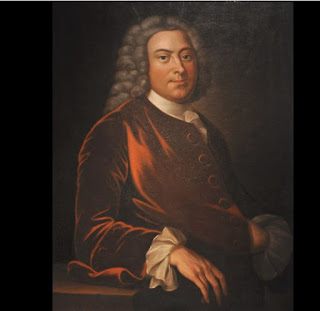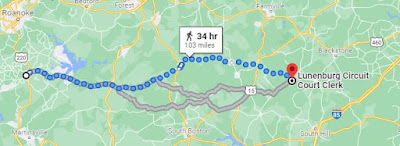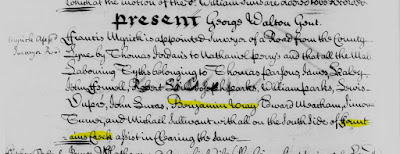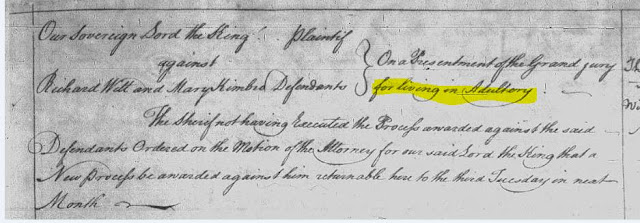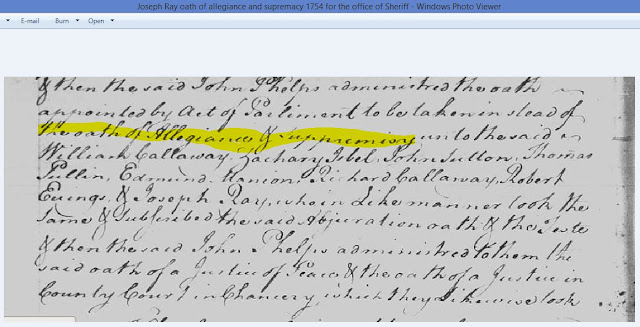Was Elizabeth Morris the mother of all of Moses Wray's children?
Elizabeth Morris, wife of Moses Wray, was the daughter of Daniel Morris and Tabitha (possibly Anderson). She may have been born in the 1730's. Her father was a resident of Augusta County, Virginia in the 1750s (now Botetourt County, Virginia) and he also had land in Bedford County, Virginia. The children of Moses Wray were born between the mid to early 1750s into the 1770s.
The best evidence to answer the question, as to whether Elizabeth was mother of all the Wray children, would be a marriage record for this couple. I have not been able to locate a marriage record. In areas and time periods when marriage records weren't kept or they were lost it's always been a challenge determining whether all of the children mentioned by a father in his will belong to one wife. Women sometimes died young and many died from childbirth.
Looking at some previous research for this couple there is speculation that Elizabeth Wray may have been a 2nd wife. This speculation seems to arise from the fact Elizabeth wasn't referred to as Elizabeth Wray or Ray in her father Daniel Morris' will. None of the children were listed with a last name and likely that has no significance. Also we don't know when the will was written. The date recorded was 1767 but was added in 1951, and was said to come from the original will.
Below is the will of Daniel Morris. He didn't state the year when he made out this will.
Below is the note added by the clerk in 1951 said to be from the original will.
Daniel Morris' wife Tabitha died in 1778 and has a will recorded which names her daughter as Betsy Ray so we know for certain that she is married to Moses Wray by this date. (of course Betsy is a nickname for Elizabeth).
Some people have speculated that Elizabeth Morris married Moses Wray some time after the 1767 date on Daniel's will?
Another reason why there is speculation about whether Elizabeth was mother of all the children is the fact that Moses named 17 children in his will. Is it likely one woman could have given birth to this many children? If she were a very young woman when she first married it is possible, rare, but possible. A woman can give birth up until menopause although the likelihood diminishes with age. My mother was 43 when I was born and here I am.
Multiple births did occur in the past like they do today. Just because a woman had 17 children doesn't mean she gave birth 17 times. A neighbor of mine had 8 children and all of them were twins.
Elizabeth provided some clues as to when she married Moses by naming some of her children after her parents and siblings. Since there are no birth records available for that time and place establishing the ages of the children named after her family members would have to come from marriage records and when the males appeared on tax lists.
Daniel Wray, Moses and Elizabeth's son, would likely have been named after Elizabeth's father. He first appears on Bedford tax lists 1782. He was over 16 that year.
The categories at the top of the tax list indicate that the 2nd to the last row gave the number of white males over 16 on this 1782 tax list.
Daniel doesn't appear on tax lists again until the area the family lived became a part of Franklin County, Virginia. In 1786 he was over 21 so he must have been born in 1765 or 1764.
Elizabeth Morris also had a brother named Ezekiel. She named a son Ezekiel also. Her son Ezekiel was first listed in tax lists as over 21 in 1787. He was likely born about 1766.
It definitely is possible that Elizabeth Morris married Moses Wray just before Daniel's birth in 1764 or 1765? But it's also possible the family waited before they named a child Daniel after Elizabeth's father or there was a Daniel born earlier who died?
The eldest daughter of Elizabeth and Moses has been speculated to be Mary. She was married to John Wright but exactly when is not known? According to several trees posted online at Ancestry.com she was born between 1753 and 1756. Three of the children said to belong to John Wright and Mary Wray are Tabitha Wright, Ezekiel Wright, and Elizabeth Wright. The use of these names would suggest Elizabeth Morris likely was Mary's mother and Tabitha her grandmother. Since I can't confirm when John and Mary were married I have not been able to document the trees I've found. According to Tabitha's tombstone she was born in 1771. If I could confirm she is a daughter of Mary I could surmise when Mary was born?
Were Daniel Morris and Tabitha old enough to be grandparents of the Wray children born in the mid to early 1750s? Daniel Wray definitely does sound like he would be old enough because he aged out of taxation back in 1753. According to court orders he is exempted from being taxed due to his great age and infirmity.
Since women were seldom recorded in colonial records in Virginia it's impossible to determine the age of Elizabeth Morris. Looking at the possible ages of her brothers her eldest brother Ezekiel could have been born in the 1730s? If his sister was also born in that decade she definitely would have been old enough to have been the mother of the eldest Wray children.
This is important to me because my ancestor Benjamin Wray was born in 1756 and I would like to confirm Elizabeth Morris was his mother, as has been assumed.
My ancestor Benjamin Wray's, born about 1756, son of Moses Wray and maybe Elizabeth Morris, full name is often recorded in online trees as Benjamin "Oat" Wray. Actually I believe my Benjamin is being confused with a descendant named Benjamin Oat Wray. It was very uncommon for someone to have a middle name in the mid 18th century.
A descendant of Benjamin Wray named Benjamin Oat Wray was born in 1855 in Franklin County, Virginia.
Benjamin Wray's brother James, who likely was a year or two older, had some connection to an Otey family. The name Otey was used by his family for generations as a first name or middle name. It could be a wife of James Wray was an Otey? If it comes down through the Wray family is it related to Benjamin's descendants using the name Oat as a middle name. Could James and Benjamin's mother have been an Otey instead of Elizabeth Morris?
There was an Otey family living in Franklin County, Virginia but they didn't show up in local records until after the birth of both James and Benjamin Wray. So I'm tending to think there is another relationship with these families that occurred much later.
James Wray, likely being the eldest male also gave me pause for thought. Where didn't the name James come from? It didn't come from Elizabeth Morris' family, apparently. Thinking about it, it is possible James was named after the river he was probably born by. The James River could have been the inspiration for the name?
So is Elizabeth Morris my Benjamin Wray's mother? Benjamin never names his mother in any documents I've seen. In his Revolutionary War pension file Benjamin states he was born in James River, Virginia. I always felt like he must have been born in eastern Virginia because I had never been to that part of Virginia didn't know the river ran through todays Bedford and Botetourt counties. The Wray family lived on Maggotty Creek in today's Franklin County, Virginia. This area was previously in Bedford County. The county seat of Bedford County wasn't far from the James River which formed a boundary between Bedford and Albemarle, now Amherst County.
Elizabeth Morris' father owned land on the James River in what was Augusta County, Virginia and now is Botetourt County. This suggests that Elizabeth Morris could be the mother of my Benjamin Wray.
Daniel Morris had his land surveyed on the James River in 1753 which was before the birth of my ancestor Benjamin Wray. We know the location of the land because it is on the James River at Catawba Creek.
Moses Wray appears on tax lists for the Maggotty Creek area in 1749 with Joseph "Rae" or Wray and then disappears from the lists. He disappears from the lists in the 1750's and doesn't appear in local records again until about 1760. I believe he was living on the James River, possibly near Daniel Morris. There was a gap in the mountains in what is today Franklin County which would lead up to the James River in today's Botetourt County which at the time was Augusta County. The James River would have been a good waterway to transport crops farther east to places like Richmond. The Wray and Morris family were pioneers in western Virginia. The markets for their crops would have been farther east.

A likely brother of Moses Wray named Joseph owned some land near Daniel Morris in Bedford County. The Morris family had land on Elk Creek and Joseph Wray purchased land on Elk Creek in 1756. The question is did Moses Wray meet and marry Elizabeth Morris after Joseph Wray bought land on Elk Creek or did they meet in the area of James River or in Bedford County earlier? Did Elizabeth give birth to Benjamin on the James River land her family owned?
Another thing I discovered during my years of genealogy research is names like Mary, Sarah, and Elizabeth were very common. One of my ancestors lost his first wife Mary and then married another woman named Mary. So it's not impossible for a man to marry more than once with a wife who has the same first name adding more confusion to the situation.
It's definitely a guess that Elizabeth Morris is the mother of all of the Wray children. It has not been proven without a doubt. If anyone has any additional information please leave a comment below.
